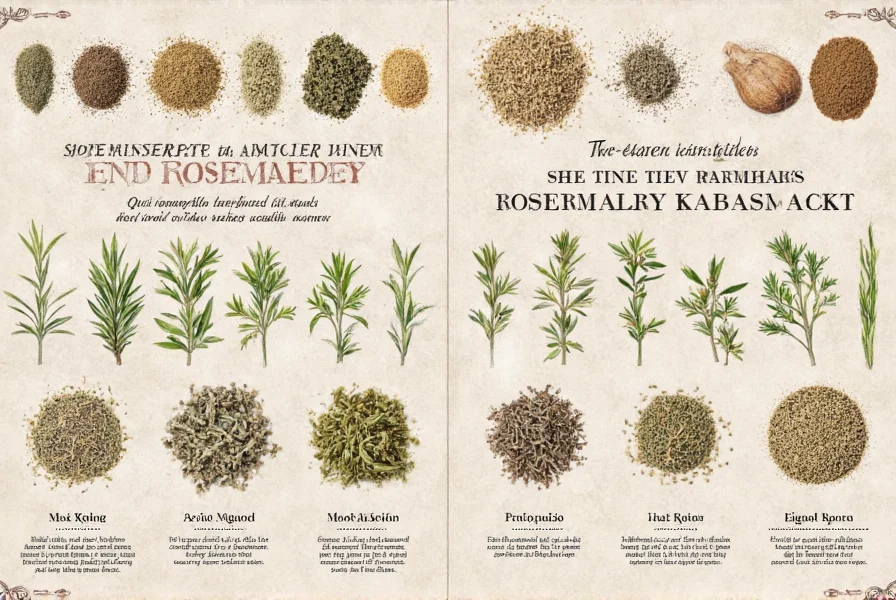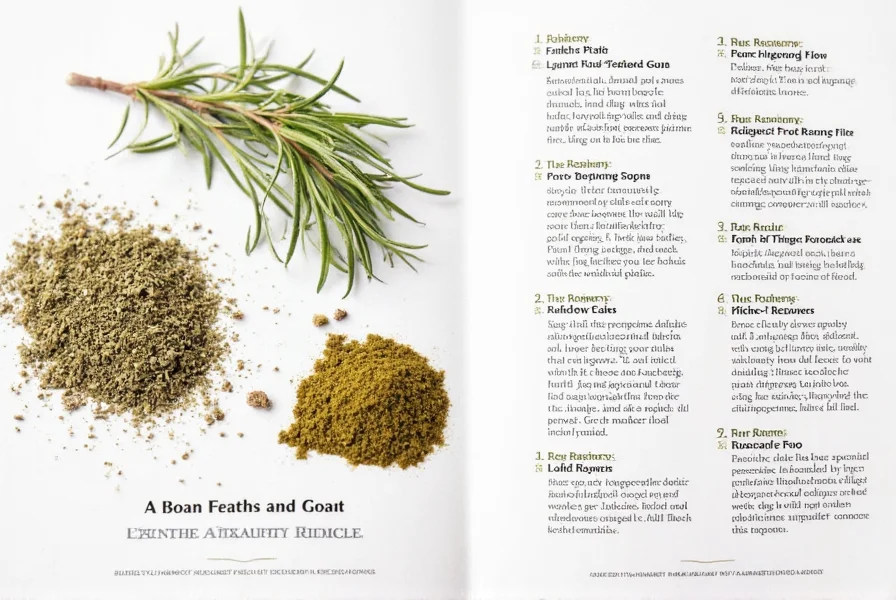Rosemary spices are dried leaves from the rosemary plant (Rosmarinus officinalis), a fragrant evergreen herb native to the Mediterranean. These spices are widely used in cooking to add a pine-like, slightly bitter flavor to dishes. According to the United States Department of Agriculture (USDA), rosemary is one of the most popular culinary herbs globally, with applications ranging from savory dishes to herbal teas and natural remedies.

Whether you're an amateur cook or a seasoned chef, understanding how to use rosemary can elevate your culinary game. This guide covers everything from basic usage to advanced applications, backed by culinary experts and scientific research.
If you're new to using rosemary, here are some practical tips to help you make the most of this versatile spice:
- Use Fresh or Dried Rosemary: While dried rosemary is commonly found in spice jars, fresh rosemary adds a brighter, more intense flavor. Use fresh when possible, but dried is perfect for long-term storage.
- Infuse Oils and Vinegars: Add a few sprigs of rosemary to olive oil or balsamic vinegar for a delicious, aromatic base for dressings, marinades, or even as a dip.
- Pair with Herbs Like Thyme and Lavender: Rosemary works well with other earthy herbs. Try combining it with thyme, oregano, or lavender for complex flavor profiles.
- Roast Vegetables and Meats: Sprinkle rosemary over roasted potatoes, carrots, or chicken for a burst of herbal flavor.
- Make Tea: Steep dried rosemary in hot water for a refreshing, slightly bitter tea that may also support digestion.

These tips will help you unlock the full potential of rosemary spices in your kitchen. Now, let's take a deeper look at what makes rosemary so unique.
Rosemary (Rosmarinus officinalis) is native to the Mediterranean region and has been used since ancient times. It's not just a spice—it's a symbol of remembrance and friendship in many cultures. But beyond its cultural significance, rosemary is packed with health benefits and culinary versatility.
The key compounds in rosemary include rosmarinic acid, which has antioxidant properties, and essential oils like cineole and camphor, which contribute to its strong scent and flavor. According to the National Institutes of Health (NIH), these compounds also make rosemary useful in aromatherapy and natural remedies.
To keep your rosemary spices at their best:
- Store Fresh Rosemary: Wrap it in a damp paper towel and place it in a plastic bag in the fridge. It should last up to a week.
- Dry and Store Dried Rosemary: Tie the sprigs together and hang them in a cool, dark place to dry. Once dried, store in an airtight container away from light and heat.
Proper storage ensures that your rosemary retains its potency and flavor for longer periods.
With so many options available, choosing the right rosemary spices can be overwhelming. Here's a guide to help you find the best products for your needs:
| Product | Features | Advantages | Best For |
|---|---|---|---|
| Fresh Rosemary Bunch | Firm, green sprigs | Maximum flavor and freshness | Cooking, garnishing, infusion |
| Dried Rosemary in Jar | Dark green, crumbly leaves | Long shelf life, easy to store | Seasoning, baking, slow cooking |
| Rosemary Essential Oil | Pure, cold-pressed | Great for aromatherapy and DIY recipes | Relaxation, cleaning, natural remedies |
| Herb Blend with Rosemary | Combines with thyme, oregano, etc. | Convenient for seasoning dishes | Quick meals, roasting, grilling |
Each product serves a different purpose, so choose based on your needs and how often you plan to use rosemary in your cooking or wellness routines.
Fresh rosemary has a brighter, more intense flavor with higher moisture content, while dried rosemary has a more concentrated, slightly woodier taste. As a general rule, 1 teaspoon of dried rosemary equals about 1 tablespoon of fresh rosemary. Fresh rosemary is best for immediate use in garnishes or dishes where you want a vibrant herbal note, while dried rosemary works well in slow-cooked dishes where it has time to rehydrate.
To store fresh rosemary, wrap it in a slightly damp paper towel and place it in a plastic bag in the refrigerator, where it will stay fresh for up to two weeks. For longer storage, you can freeze fresh sprigs in freezer bags. Dried rosemary should be stored in an airtight container away from light and heat, where it will maintain its potency for 6-12 months. Proper storage is crucial for preserving rosemary's aromatic oils and flavor compounds.
Rosemary pairs exceptionally well with roasted meats (especially lamb, chicken, and pork), potatoes, root vegetables, breads, and tomato-based sauces. Its pine-like flavor complements garlic, lemon, olive oil, and other Mediterranean ingredients. It works beautifully in soups, stews, and braises. For a surprising twist, try adding a small sprig to apple pies or other fruit desserts for a unique herbal note.
Rosemary has a strong flavor, so it's best used sparingly. For most dishes serving 4-6 people, 1-2 teaspoons of dried rosemary or 1-2 tablespoons of fresh rosemary is sufficient. When using fresh sprigs in roasting or braising, 2-3 small sprigs are typically enough. Remember that rosemary's flavor intensifies during cooking, so it's better to start with less and add more if needed. Whole sprigs can be removed before serving if desired.
Yes, but with adjustments. The general conversion is 1 teaspoon of dried rosemary equals 1 tablespoon of fresh rosemary. Keep in mind that dried rosemary needs time to rehydrate, so it's better suited for longer cooking methods like stews or braises, while fresh rosemary works well for quick-cooking preparations. Dried rosemary has a more concentrated flavor, so taste as you go when substituting.
Rosemary contains rosmarinic acid, which has antioxidant and anti-inflammatory properties. According to the National Institutes of Health (NIH), it may support memory and concentration, aid digestion, and has been studied for potential cognitive benefits. The essential oils in rosemary (like cineole) may help with respiratory issues when inhaled. However, rosemary should be consumed in culinary amounts as extremely large quantities can be problematic. Always consult with a healthcare provider before using rosemary for medicinal purposes.
Rosemary spices are more than just a flavoring agent—they're a powerful tool in both the kitchen and the wellness routine. With its rich history, unique aroma, and wide range of applications, rosemary deserves a spot in every spice cabinet. Whether you're looking to enhance your meals, create homemade infusions, or simply enjoy the calming scent of rosemary in your home, this herb offers something for everyone.
So next time you're planning a meal or reaching for a bottle of oil, consider adding a touch of rosemary. Its versatility and fragrance make it a true gem in the world of spices. As the saying goes, "A little rosemary goes a long way."










 浙公网安备
33010002000092号
浙公网安备
33010002000092号 浙B2-20120091-4
浙B2-20120091-4